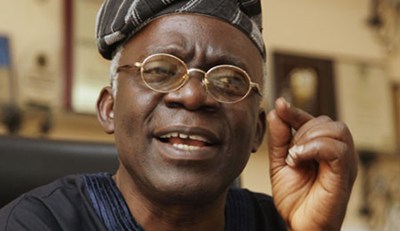
Mr. Femi Falana
Wants N’Assembly to repeal law
Ejiofor Alike

A constitutional lawyer and Senior Advocate of Nigeria (SAN), Mr. Femi Falana, has stated that the fiscal incentives given to the oil companies operating in Nigeria in the Deep Offshore and Inland Basin Production Sharing Contract Act of 1999 have led to the loss of $7 billion by the federal government.
Falana in a statement on Sunday, called on the National Assembly to repeal the law, which was enacted by the military administration of retired General Abdulsalami Abubakar in 1999.
According to him, the Abdulsalami Abubakar military regime enacted the PSC Act Decree in order to give effect to certain fiscal incentives for the oil and gas companies operating in the Deep Offshore and Inland Basin under PSCs between the Nigerian National Petroleum Corporation (NNPC) and other companies holding oil prospective licenses or mining licenses and various petroleum exploration and production companies.
He said by virtue of Section 5 of the Act, the payment of royalty in respect of the Deep Offshore production sharing contracts shall range from four to 12 per cent while no royalty shall be paid whatsoever in areas in excess of 1,000 metres depth.
“Since a large quantity of the oil produced by Nigeria is located beyond 1, 000 metres depth, the multinational oil companies have taken advantage of the Act to avoid the payment of royalties to the Federation Account. The fiscal incentives given to the oil companies have led to the loss of several billion of dollars by the federal government,” Falana said.
The constitutional lawyer insisted that as the existence of the obnoxious law can no longer be justified, the National Assembly ought to repeal or amend it by taking advantage of Section 16 of the Act.
Falana noted that Section 16 provides for a review “after a period of 15 years from the commencement and every five years thereafter.”
According to him, “In view of the fact that the 15-year period of non-payment of royalty expired last year the National Assembly should amend section 5 of the Act by deleting the section which provides for zero per cent royalty in areas of 1,000 metres.”
“If the National Assembly fails to discharge its constitutional duty in the circumstance we shall not hesitate to file an application for mandamus at the Federal High Court with a view to ensuring compliance with the law forthwith,” he said.
He threatened to go to court to get the situation reversed, “if the National Assembly fails to discharge its constitutional duty.”
Section 5 (1) of the Act provides that “the payment of royalty in respect of the Deep Offshore PSCs shall be graduated as follows, that is – (a) 12 per cent in areas from 201 to 500 metres depth; (b) eight per cent in areas from 501 to 800 metres water depth; (c) four per cent in areas from 801 to 1,000 metres water depth; and (d) 0 per cent in areas in excess of 1,000 metres water depth.”
SOURCE : THISDAY
FRENCH VERSION
Falana dans une déclaration dimanche, a appelé l’Assembléenationale d’abroger la Loi, qui a été adoptée par l’administrationmilitaire d’ancien général Abdulsalami Abubakar, en 1999.
Selon lui, le régime militaire d’Abdulsalami Abubakar apromulgué le décret de loi sur la CFP afin de donner effet àcertaines incitations fiscales pour les compagnies pétrolières etgazières opérant dans le bassin intérieur sous CSP entre laNigerian National Petroleum Corporation (NNPC) et les autresentreprises qui détiennent des licences éventuel d’huile oupermis miniers et pétroliers divers entreprises d’exploration et deproduction et de l’Offshore profond.
Dit-il en vertu de l’article 5 de la Loi, du paiement de redevancesà l’égard de la production Offshore profond, contrats de partagedoit varier de quatre à 12 pour cent alors qu’aucune redevancen’est versée que ce soit dans les zones supérieure à 1 000 mètresde profondeur.
« Comme une grande quantité de l’huile produite par le Nigériase trouve au-delà de 1 000 mètres de profondeur, lescompagnies pétrolières multinationales ont profité de la Loi afind’éviter le paiement de redevances sur le compte de laFédération. Les mesures d’incitation fiscales accordées auxcompagnies pétrolières ont conduit à la perte de plusieursmilliards de dollars par le gouvernement fédéral,”a déclaréFalana.
Le constitutionnaliste a insisté pour que, comme l’existence de laloi odieuse peut ne plus être justifié, l’Assemblée nationaledevrait d’abroger ou d’amender en se prévalant de l’article 16 dela Loi.
Falana a noté que l’article 16 prévoit un examen « après unepériode de 15 ans depuis le début et ensuite tous les cinq ans. »
Selon lui, « Étant donné que la période de 15 ans de non-paiement des redevances a expiré l’an dernier, l’Assembléenationale devrait modifier l’article 5 de la loi en supprimantl’article qui prévoit zéro pour cent des redevances dans les zonesde 1 000 mètres. »
“Si l’Assemblée nationale échoue à s’acquitter de son obligationconstitutionnelle en la circonstance que nous n’hésiterons pas àdéposer une demande de mandamus à la Haute Cour fédéraleen vue d’assurer la conformité avec la loi sans délai”, a-t-il dit.
Il a menacé d’aller au Tribunal pour obtenir la situation inverse, « si l’Assemblée nationale ne parvient pas à s’acquitter de sonobligation constitutionnelle. »


